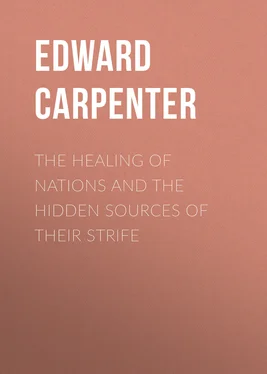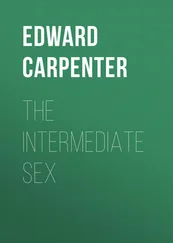Edward Carpenter - The Healing of Nations and the Hidden Sources of Their Strife
Здесь есть возможность читать онлайн «Edward Carpenter - The Healing of Nations and the Hidden Sources of Their Strife» — ознакомительный отрывок электронной книги совершенно бесплатно, а после прочтения отрывка купить полную версию. В некоторых случаях можно слушать аудио, скачать через торрент в формате fb2 и присутствует краткое содержание. Жанр: foreign_prose, История, foreign_edu, foreign_antique, на английском языке. Описание произведения, (предисловие) а так же отзывы посетителей доступны на портале библиотеки ЛибКат.
- Название:The Healing of Nations and the Hidden Sources of Their Strife
- Автор:
- Жанр:
- Год:неизвестен
- ISBN:нет данных
- Рейтинг книги:4 / 5. Голосов: 1
-
Избранное:Добавить в избранное
- Отзывы:
-
Ваша оценка:
- 80
- 1
- 2
- 3
- 4
- 5
The Healing of Nations and the Hidden Sources of Their Strife: краткое содержание, описание и аннотация
Предлагаем к чтению аннотацию, описание, краткое содержание или предисловие (зависит от того, что написал сам автор книги «The Healing of Nations and the Hidden Sources of Their Strife»). Если вы не нашли необходимую информацию о книге — напишите в комментариях, мы постараемся отыскать её.
The Healing of Nations and the Hidden Sources of Their Strife — читать онлайн ознакомительный отрывок
Ниже представлен текст книги, разбитый по страницам. Система сохранения места последней прочитанной страницы, позволяет с удобством читать онлайн бесплатно книгу «The Healing of Nations and the Hidden Sources of Their Strife», без необходимости каждый раз заново искать на чём Вы остановились. Поставьте закладку, и сможете в любой момент перейти на страницу, на которой закончили чтение.
Интервал:
Закладка:
"Germany," said Peter Kropotkin 4 4 Wars and Capitalism , by P. Kropotkin. (Freedom Press.)
a year or two ago, "on entering a striking period of juvenile activity, quickly succeeded in doubling and trebling her industrial productivity, and soon increasing it tenfold; and now the German middle classes covet new sources of enrichment in the plains of Poland, in the prairies of Hungary, on the plateaux of Africa, and especially around the railway line to Baghdad—in the rich valleys of Asia Minor, which can provide German capitalists with a labouring population ready to be exploited under one of the most beautiful skies in the world. It may be so with Egypt some day. Therefore it is ports for exports, and especially military ports, in the Adriatic, the Persian Gulf, on the African coast in Beira, and also in the Pacific, that these schemers of German colonial trade wish to conquer. Their faithful servant, the German Empire, with its armies and ironclads, is at their service for this purpose."
It is this class, then, which by backing both financially and morally the military class has been chiefly responsible for bringing about the war. Not that I mean, in saying so, that the commercial folk of Germany have directly instigated its outbreak at the present moment and in the present circumstances—for many, or most of them, must have seen how dangerous it was likely to prove to their trade. But in respect of the general policy which they have so long pursued they are responsible. One cannot go on for years (and let England, too, remember this) preaching militarism as a means of securing commercial advantage, and then refuse to be answerable for the results to which such a policy may lead. The Junker classes of Prussia and their Kaiser might be suffering from a bad attack of swelled head; vanity and arrogance might be filling them with dreams of world-empire; but there would have been no immediate European war had not the vast trade-interests of Germany come into conflict, or seemed to come into conflict, with the trade-interests of the surrounding nations—had not the financial greed of the nation been stirred, as well as its military vanity.
And talking of general trade and finance, one must not forget to include the enormous powers exercised in the present day by individual corporations and individual financiers who intrude their operations into the sphere of politics. We saw that in our own Boer War; and behind the scenes in Germany to-day similar influences are at work. The Deutsche Bank, with immense properties all over the world, and some £85,000,000 sterling in its hands in deposits alone, initiated financially the Baghdad Railway scheme. Its head, Herr Arthur von Gwinner, the great financier, is a close adviser of the Kaiser. "The railway is already nearly half built, and it represents a German investment of between £16,000,000 and £18,000,000. Let this be thought of when people imagine that Germany and Austria went to war with the idea of avenging the murder of an Archduke…. All German trade would suffer if the Baghdad Railway scheme were to fail." 5 5 See Nash's Magazine for October, 1914, article by "Diplomatist."
Then there is Herr August Thyssen—"King Thyssen"—who owns coalmines, rolling mills, harbours, and docks throughout Germany, iron-ore mines in France, warehouses in Russia, and entrepôts in nearly every country from Brazil and Argentina to India. 6 6 Ibid.
He has declared that German interests in Asia Minor must be safeguarded at all costs. But Russia also has large prospective commercial interests in Asia Minor. The moral is clear and needs no enforcing. Such men as these—and many others, the Rathenaus, Siemens, Krupps, Ballins, and Heinekens—exercise in Germany an immense political influence, just as do our financial magnates at home. They represent the peaks and summits of wide-spreading commercial activities whose bases are rooted among the general public. Yet through it all it must not be forgotten that they represent in each case (as I shall explain more clearly presently) the interests of a class —the commercial class—but not of the whole nation.
One must, then, modify the first conclusion, that the blame of the war rests with the military class, by adding a second factor, namely, the rise and influence of the commercial class. These two classes, acting and reacting on each other, and pushing—though for different reasons—in the same direction, are answerable, as far as Germany is concerned, for dragging Europe into this trouble; and they must share the blame.
If it is true, as already suggested, that Germany's action has only been that of the spark that fires the magazine, still her part in the affair affords such an extraordinarily illuminating text and illustration that one may be excused for dwelling on it.
Here, in her case, we have the divisions of a nation's life set out in well-marked fashion. We have a military clique headed by a personal and sadly irresponsible ruler; we have a vulgar and much swollen commercial class; and then, besides these two, we have a huge ant's nest of professors and students, a large population of intelligent and well-trained factory workers, and a vast residuum of peasants. Thus we have at least five distinct classes, but of these the last three have—till thirty or forty years ago—paid little or no attention to political matters. The professors and students have had their noses buried in their departmental science and fach studies; the artisans have been engrossed with their technical work, and have been only gradually drifting away from their capitalist employers and into the Socialist camp; and the peasants—as elsewhere over the world, absorbed in their laborious and ever-necessary labours—have accepted their fate and paid but little attention to what was going on over their heads. Yet these three last-mentioned classes, forming the great bulk of the nation, have been swept away, and suddenly at the last, into a huge embroilment in which to begin with they had no interest or profit.
This may seem strange, but the process after all is quite simple, and to study it in the case of Germany may throw helpful light on our own affairs. However the blame may be apportioned between the Junker and commercial classes, it is clear that, fired by the Bismarckian programme, and greatly overstretching it, they played into each other's hands. The former relied for the financing of its schemes on the support of the commercials. The latter saw in the militarists a power which might increase Germany's trade-supremacy. Vanity and greed are met together, patriotism and profits have kissed each other. A Navy League and an Army League and an Air League arose. Professors and teachers were subsidized in the universities; the children were taught Pan-Germanism in the schools; a new map of Europe was put before them. An enormous literature grew up on the lines of Treitschke, Houston Chamberlain, and Bernhardi, with novels and romances to illustrate side-issues, and the Press playing martial music. The students and intellectuals began to be infected; the small traders and shopkeepers were moved; and the war-fever gradually spread through the nation. As to the artisans, they may, as I have said, have largely belonged to the Socialist party—with its poll of four million votes in the last election—and in the words of Herr Haase in the Reichstag just before the war, they may have wished to hold themselves apart from "this cursed Imperialist policy"; but when the war actually arrived, and the fever, and the threat of Russia, and the fury of conscription, they perforce had to give way and join in. How on earth could they do otherwise? And the peasants—even if they escaped the fever—could not escape the compulsion of authority nor the old blind tradition of obedience. They do not know, even to-day, why they are fighting; and they hardly know whom they are fighting, but in their ancient resignation they accept the inevitable and shout "Deutschland über Alles" with the rest. And so a whole nation is swept off its feet by a small section of it, and the insolence of a class becomes, as in Louvain and Rheim's, the scandal of the world. 7 7 In order to realize how easy such a process is, we have only to remember the steps by which the outbreak of the Boer War in 1899 was engineered.
Интервал:
Закладка:
Похожие книги на «The Healing of Nations and the Hidden Sources of Their Strife»
Представляем Вашему вниманию похожие книги на «The Healing of Nations and the Hidden Sources of Their Strife» списком для выбора. Мы отобрали схожую по названию и смыслу литературу в надежде предоставить читателям больше вариантов отыскать новые, интересные, ещё непрочитанные произведения.
Обсуждение, отзывы о книге «The Healing of Nations and the Hidden Sources of Their Strife» и просто собственные мнения читателей. Оставьте ваши комментарии, напишите, что Вы думаете о произведении, его смысле или главных героях. Укажите что конкретно понравилось, а что нет, и почему Вы так считаете.












